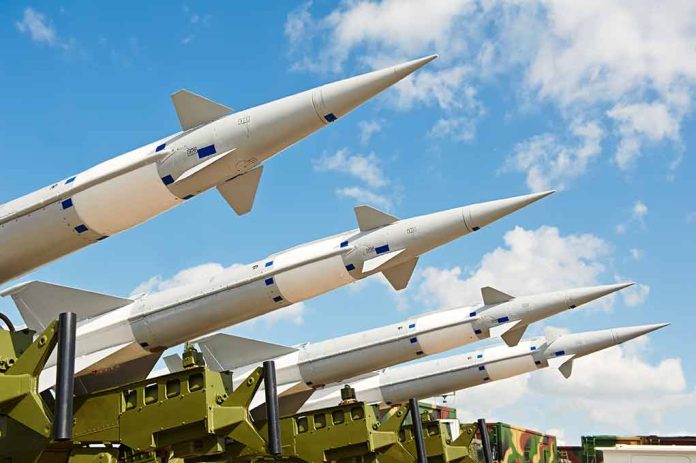
Israeli airstrikes struck Iranian nuclear facilities after Tehran unveiled its third uranium enrichment site, defying international warnings and plunging the Middle East into what President Trump calls a potential “massive conflict.”
Key Takeaways
- The International Atomic Energy Agency (IAEA) has formally concluded Iran is in breach of its non-proliferation obligations for the first time in 20 years
- Iran responded by activating a third uranium enrichment facility and installing advanced IR-6 centrifuges, significantly increasing enriched uranium production
- Israel conducted airstrikes on Iranian nuclear targets, with Prime Minister Netanyahu vowing to continue until “this threat” is removed
- President Trump warned of potential airstrikes if negotiations fail, while still expressing hope for a diplomatic resolution
- The US is evacuating diplomatic personnel from Iraq amid escalating threats from Iran’s Defense Minister and the IRGC
IAEA Declares Iran Non-Compliant as Nuclear Crisis Escalates
In a pivotal development that has sharply escalated tensions in the Middle East, the International Atomic Energy Agency (IAEA) board of governors passed a resolution formally declaring Iran in breach of its nuclear non-proliferation obligations. The resolution, submitted by the United States, the United Kingdom, France, and Germany, received approval from 19 countries, with Russia, China, and Burkina Faso opposing it. The declaration marks the first time in two decades that Iran has been found in formal non-compliance, citing Tehran’s failure to provide full cooperation regarding undeclared nuclear material and activities at multiple sites since 2019.
“The Board of Governors finds that Iran’s many failures to uphold its obligations since 2019 to provide the agency with full and timely cooperation regarding undeclared nuclear material and activities at multiple undeclared locations in Iran constitutes non-compliance with its obligations under its Safeguards Agreement with the Agency,” stated the IAEA resolution, according to Reuters.
The resolution specifically cites Iran’s failure to explain uranium traces found at undeclared sites, which Western officials suspect indicate a covert nuclear weapons program that operated until 2003. The IAEA’s comprehensive report criticized Iran’s lack of cooperation, raising significant concerns about the peaceful nature of its nuclear program. Despite the damning conclusion, the IAEA stopped short of referring Iran’s non-compliance to the UN Security Council, which would potentially trigger the reinstatement of international economic sanctions.
Iran’s Defiant Response Heightens Nuclear Threat
Iran swiftly condemned the IAEA resolution as politically motivated and announced plans to establish a new uranium enrichment facility while upgrading existing sites with advanced centrifuges. Iranian President Masoud Pezeshkian adopted a hardline stance following the vote, doubling down on the country’s commitment to uranium enrichment. This marks a significant escalation in Iran’s nuclear ambitions, which had already reached concerning levels with enrichment at 60% purity as of February 2025 – a threshold dangerously close to weapons-grade material.
“We will go our own way, we will have enrichment and we will not back down,” declared President Masoud Pezeshkian, signaling Iran’s defiance of international pressure.
Behrouz Kamalvandi, spokesperson for the Atomic Energy Organization of Iran (AEOI), confirmed the activation of a third uranium enrichment facility and plans to upgrade the Fordow facility with advanced IR-6 centrifuges. “The implication of this is that our production of enriched materials will significantly increase,” Kamalvandi warned, adding that “The more pressure is applied, the stronger Iran’s response will be.” The AEOI described the IAEA resolution as “coercive and unjust,” vowing to continue its nuclear expansion in direct defiance of international concerns.
Israel Strikes Iranian Nuclear Sites as Regional War Looms
The situation rapidly deteriorated as Israel launched targeted airstrikes against Iranian nuclear facilities, following through on long-standing threats to prevent Iran from obtaining nuclear weapons capability. The precision strikes reportedly caused significant damage to Iran’s nuclear infrastructure, with explosions reported in Tehran. Israeli Prime Minister Benjamin Netanyahu made clear that these operations would continue “to remove this threat,” indicating a sustained campaign against Iran’s nuclear program that could trigger wider regional conflict.
“BE A DANGEROUS PLACE,” warned President Trump in a statement addressing the escalating situation, underscoring the gravity of the crisis.
The Iranian Revolutionary Guard Corps (IRGC) has vowed retaliation against Israel, leading to a dramatic increase in military posturing across the Middle East. In a precautionary move, the United States has begun evacuating diplomatic personnel from Iraq, recognizing the imminent threat of Iranian missile strikes against American interests in the region. The tension has profound implications for global diplomacy, energy markets, and regional security, potentially drawing in other powers with stakes in Middle East stability.
Trump Administration Pursues Diplomatic Path While Preparing for Conflict
President Trump has maintained a two-track approach to the crisis, warning of potential US or Israeli airstrikes if negotiations fail while simultaneously pushing for a diplomatic resolution. The administration is engaged in ongoing talks with Iran regarding its nuclear program, with a sixth round of negotiations scheduled to take place in Oman. These diplomatic efforts take on added urgency as the authority to reinstate sanctions from the 2015 Iran nuclear deal is set to expire in October, creating a critical timeline for resolution.
“The Islamic Republic of Iran has no choice but to respond to this political resolution,” stated a joint statement from the Iranian Foreign Ministry and the Atomic Energy Organization of Iran, setting the stage for further escalation if diplomatic efforts fail.
The crisis represents a significant test for President Trump’s Middle East policy, balancing support for Israel’s security concerns while attempting to avoid a full-scale regional war that could disrupt global oil markets and require substantial American military involvement. US officials have stressed that while diplomatic channels remain open, military options remain on the table if Iran continues its nuclear advancement. With both sides seemingly entrenched in their positions, the prospect of de-escalation appears increasingly remote as the Middle East edges closer to widespread conflict.




